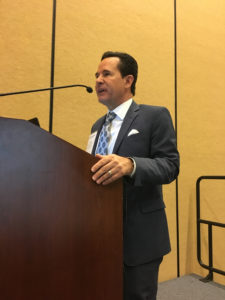Does large group consolidation benefit anesthesiology as a specialty?
“We need to think about aggregating as specialists because there’s too much going on in health care,” said Gerald A. Maccioli, M.D., M.B.A., FCCM, FASA, Chief Quality Officer, Medical Director-Clinical Research & Scientific Intelligence with Envision Healthcare.

Gerald A. Maccioli, M.D., M.B.A., FCCM, FASA, discusses the pros of large group consolidation.
In Tuesday’s session “Large Group Consolidation: Is It Beneficial for the Specialty of Anesthesia?,” Dr. Maccioli presented convincing “pro” arguments and a bird’s eye view of the health care landscape. MACRA is a prime example of the “noise” going on with health care. MACRA repeals the SGR formula, changes the way Medicare rewards clinicians for value over volume and streamlines multiple quality programs under the new Merit-Based Incentive Payment System (MIPS).
“Roughly 47 percent of physicians say they’ve heard about MACRA, but don’t know anything about it,” Dr. Maccioli said. Yet, the costs of MACRA quality reporting are substantial. “The cost of practicing now is just too great for individual groups,” Dr. Maccioli said.
Moreover, mergers continue to disrupt the marketplace. CVS bought Aetna; Cigna bought ExpressScripts.
“Do you think we can negotiate drug prices with these guys?” Dr. Maccioli asked.
Joining a large group could be financially lucrative, too, at least initially. Ultimately, the decision to join a large group should be a strategic move, not a financial one. Amidst the chaos of today’s current health care “system,” seek shelter.
“Consolidation addresses the complexity and volatility of the transformation of health care,” Dr. Maccioli said. Overall, health care is fundamentally changing, and anesthesiologists have to change with it. “We’ve always done it this way is the death chant of groups who think they can continue to survive,” Dr. Maccioli said.
“A lot of things Jerry talked about I agree with,” said Jeffery S. Vender, M.D., MCCM, FCCP, M.B.A., Emeritus, Harris Family Foundation Chairman in the Department of Anesthesiology/Critical Care Services at Northshore University HealthSystem in Chicago. Dr. Vender presented the “con” argument, contending that consolidation is a trend that’s fragmenting health care. For example, “increasing ambulatory facilities leave hospitals naked,” he said.
Joining a large group may be profitable for anesthesiologists initially, but at what cost? “You become an employee, not an employer. Envision owns you,” Dr. Vender said, citing Dr. Maccioli’s corporation.
The lack of control could leave you frustrated. What guarantee will you have on staffing allocations? Could the group add more nurse anesthetists? What if your patient volume decreases and you’re unhappy with the situation? Then what? “If you’re going in to these things, no one’s protecting your interests,” Dr. Vender said.
Other unintended consequences include a profit-driven mentality and a new culture. “Group cohesion is gone,” Dr. Vender said.
If history is any indication, consolidation won’t last. Most mergers eventually fail for a variety of reasons.
“Trees don’t grow to the sky, and this won’t either,” Dr. Vender said. “There’s no reason we couldn’t merge amongst ourselves. You can do this yourself, if you want to.”
Return to Archive Index